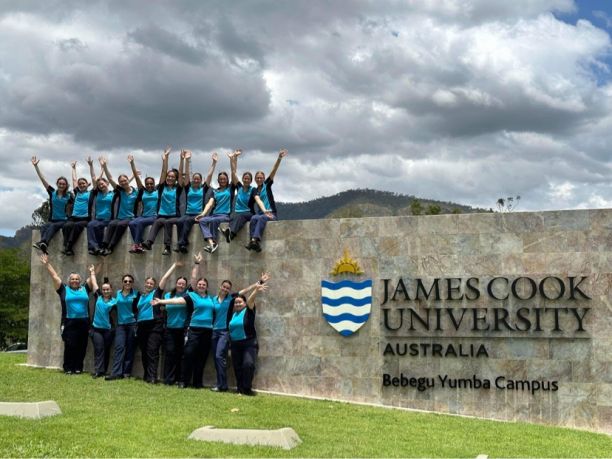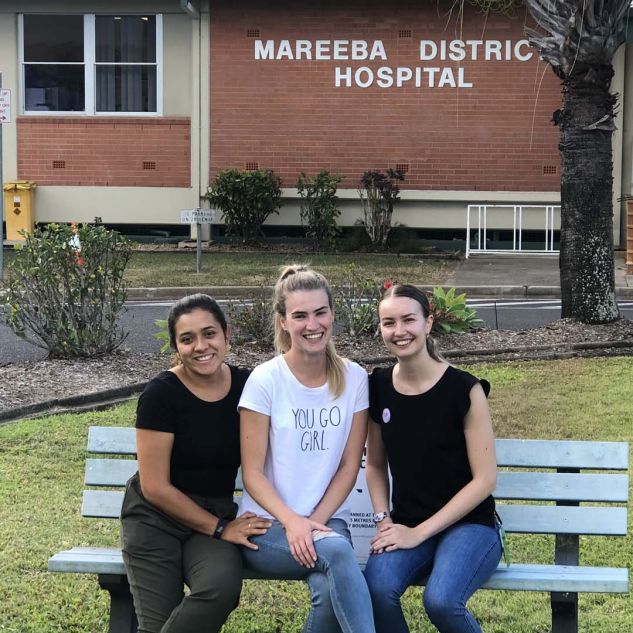
Written By
Hannah Gray
College
College of Healthcare Sciences
Publish Date
3 May 2023
Related Study Areas
A last-minute decision proved the right choice
After enrolling in JCU’s Bachelor of Nursing Science – Bachelor of Midwifery at the last minute and feeling unsure of what the degree had in store for her, Graduate Kira Teare says she feels lucky to have found her true passion in being a midwife and providing perinatal care.
With the end of Year 12 looming and feeling, as so many high school students do, uncertain about the best path for her, Kira felt pressured to pursue university study right after school. “There really is no pressure to go to uni straight away, but I felt like there was,” she says. “I thought I wanted to do medicine, but I was ’umm-ing’ and ‘ahh-ing’ over it, and I thought, ‘if I’m this unsure about medicine, it’s probably not the right choice for me’.
“So, the night before QTAC applications closed, I withdrew from medicine and switched to nursing and midwifery on a whim — just because it was kind of similar and I thought a dual degree sounded cooler! I feel so lucky because I fell into midwifery and then fell in love with it.”
Some of the things that helped Kira know that she made the right choice were evident right from her first year of study. “I really enjoyed the small class sizes at JCU because we were a close-knit group of students and knew our lecturers and tutors personally. It was lovely because we all felt like we could reach out for support at any time.
“Placements were full-on; I did around 1880 hours over my degree. They were sometimes a challenge, but they’re so worth it. And I really loved my rural placements. Those were my favourite because it’s a chance to see more of Queensland and have new experiences while learning so much about midwifery and health care.”


Pursuing the gold standard of care
After graduating at the end of 2022, Kira now works as a caseload midwife at Townsville University Hospital — a role she pursued through every avenue available to her.
“There are many options for midwifery, particularly in Townsville, but I always knew I wanted to do caseload midwifery,” Kira says. “As a caseload midwife, I work in a team with other caseload midwives and we each have our own clients. Within our caseloads are four women who are due per month, and we are their main care provider. We provide antenatal care visits, we’re on-call for their birth, and then we provide six weeks of care in their home. It's essentially having a known care provider for your whole pregnancy journey.
“Because I always wanted to do continuity of care, I did a lot of continuity of care experiences through my JCU placements with as many caseload midwives as I could. That included Midwifery Group Practice (MGP) midwives and the birth centre midwives. I basically tried to make myself known so that when it came to interviewing, it was already clear that I truly wanted to work in that area and with those midwives.”
Kira’s passion for caseload midwifery and continuity of care stems from the value of perinatal care and the benefits mothers receive from having a caseload midwife support them for the length of their pregnancy, birth and newborn stage.
“From an evidence point of view, the International Confederation of Midwives and the Australian College of Midwives support continuity of care for all women as the gold standard of care,” Kira says. "There’s a lot of research to support the benefits of continuity of care — it decreases the likelihood of a having a pre-term birth or still birth, it increases maternal satisfaction, you’re more likely to have a vaginal birth and so much more.”
Other benefits include increasing safety during labour and birth, helping midwives avoid burnout and increase job satisfaction, cost benefits for the health system, and supporting women’s rights to self-determination in terms of choice, control and education during pregnancy.
“From a research and evidence point of view, I’m really passionate about continuity of care,” Kira says. “But also, from my experience as a midwifery student, it’s so gratifying for us as midwives and for the women we care for. It’s an intimate time in a woman’s life, and it can sometimes be a scary time for a woman. You’re so much more comfortable with someone that you know. The relationship you build with your midwife makes all the difference.
“And for us as midwives, it’s really lovely. I feel like I’m playing a really important part in someone’s pregnancy, birth and post-partum journey. I met them when they were only 20 weeks, and now they’re six weeks post-partum and I don’t really want to say goodbye. So, that’s why I really enjoy this role and the continuity of care we provide.”


Being ‘with woman’ right from the start
Having only recently transitioned from being a full-time midwifery student to being a full-time midwife, Kira says becoming a main care provider was quite a pivot.
“It’s a big shift in your mindset going from being a student and having a supervisor watching over your shoulder on each of your placements, to having to look out for your own shoulder,” she says. “It was overwhelming at first, but now it’s really gratifying. It’s pretty awesome being able to write ‘Registered Midwife’ next to your name when you sign things off!”
Although the transition wasn’t effortless, Kira says she never felt ill-prepared for her role. “I did so many placements at uni, and I was so supported in my continuity of care experiences. I knew the profession and the health system quite well, so I haven’t run into anything unexpected or too difficult to achieve.
“Perhaps something I didn’t expect was the gratitude that the women I care for have shown me. Now that I’m their main care provider, they express a real appreciation for my support, even if I feel like I haven’t done much. I didn’t expect it, but it’s so rewarding.”
For those interested in pursuing midwifery or those just starting out, Kira says: you can do it!
“It is possible — you can make it. Think about the reason you’re going into midwifery. It’s more than cuddling babies. ‘Midwife’ means ‘with woman’, so think about what midwifery would mean to you personally in such a care-oriented role. Aside from that, definitely go rural with your placements, and be ready to start learning and being challenged right from your first year.”